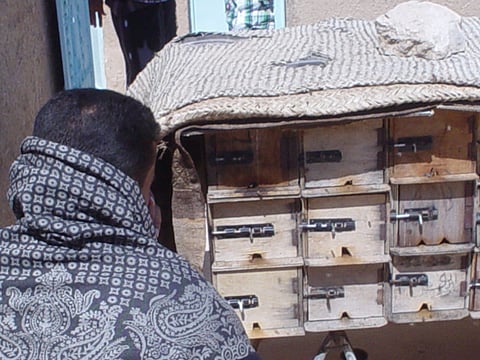Honey sustains Yemen community
Each year in September, traders make a beeline for Doan valley’s prize produce

Hadramout: The popular adage that advises against putting all the eggs in a single basket is lost on hundreds of beekeepers in Wadi Doan, or Doan valley. The long and narrow valley in Yemen’s vast south-eastern province of Hadramout is famous for its internationally-renowned honey.
Every year, the valley attracts hundreds of beekeepers from every corner of the country. Doan valley is known for its Sidra trees that are deemed a haven for bees. The annual season starts in September when the trees are in bloom and lasts for nearly 40 days during which time the valley teems with honey traders and the buzz of beehives.
The windfall revenues of previous years inspired a bee keeper known as Abu Omar to buy 600 beehives for 11,400,000 Yemeni riyal (Dh193,798) recently. For many poor Yemenis, this is one of the few business avenues that offer them strong returns.
Abu Omar says the political crisis in Yemen has led to an increase in the price of beehives and the cost of transporting them but remains fairly optimistic about this year’s season despite scarce rain and an increased incidence of Dubas disease that plagues palm trees in the area.
Abu Omar’s future rests on the honey harvest. If the harvest turns bad, he and many other beekeepers will be burdened with enormous debt. To hedge his bets, the professional beekeeper has spread out his beehives in different locations — on roofs of houses and under trees. “If some beehives don’t produce enough honey, others will compensate,” he said.
Such is the importance of the beekeeping industry to the local economy that the bees are fed sugar syrup in times of drought when there is an unusually big number of beehives.
The profitability of the business has drawn in most of the valley’s residents. As beekeeping does not require a high capital and the risks are relatively low, many people opt to set up their own micro project.
In Doan, teachers, farmers and other professionals become beekeepers during the prime season. Some enterprising people even offer to work on behalf of businessmen mainly from Saudi Arabia and other GCC states.
Beekeepers in Doan say that even if the season is not good, they can compensate part of their loses by selling the beehives and some honey, both of which help generate revenues.
Salem Raji, director of the office of the Ministry of Agriculture in Doan, said the honey produced in the valley is unique. “The honey has a unique odour in addition to many therapeutic and dietary qualities,” he said. The honey produced in Doan has a reputation for being free from any kind of chemical contamination and pesticides.
Unlike people dealing in other commodities, beekeepers usually do not make much of an effort to market the prized honey. By the time of harvest, honey traders stream into Doan and buy up most of the local produce. The less lucky beekeepers send some of their product to local honey stores in the province of Hadramout and other provinces across Yemen.
Beekeepers and traders say that Doan’s reputed honey is at risk from a parallel market supplying cheap and impure varieties as the original.
Salem admits duplicated products are hurting Doan’s reputation. He urged the government to step in to protect the beekeepers in Doan and “reinforce strict laws” against counterfeiters and to conduct awareness campaigns among beekeepers about the threat posed to their business by unscrupulous traders.
Salem said his office had received a pledge from the Arab Fund for Economic and Social Development to finance a specialised honey centre in Doan. “We hope that the centre will sieve the genuine honey from other adulterated types.”
Bees feeding in the Sidra trees of Doan produce a honey with a characteristically strong aroma. According to some beekeepers, many traders bring in honey-loaded beehives into Doan shortly before the start of the local season and mix the local produce with other varieties before selling it as authentic Doan honey. In some cases, artificial additives are used.
However, professional honey traders and bee experts use several methods to identify authentic Doan honey. ”Natural honey does not change when exposed to heating. It neither burns on heating nor freezes in the fridge. With the natural honey, the sweetness does not stay longer in the mouth,” Salem says.
— Saleh Khaled contributed to this report



